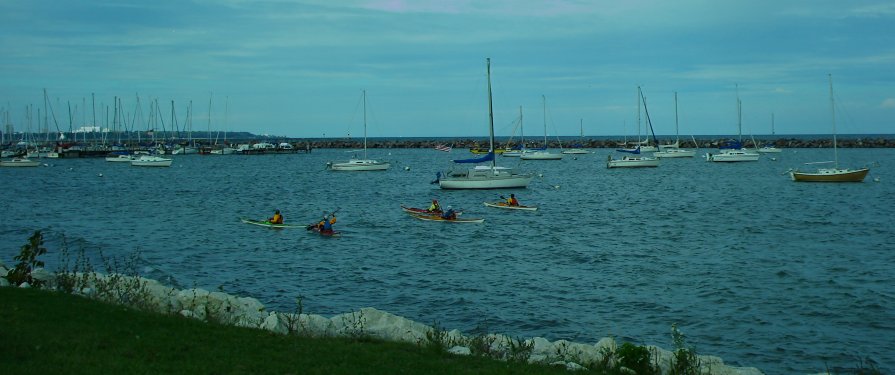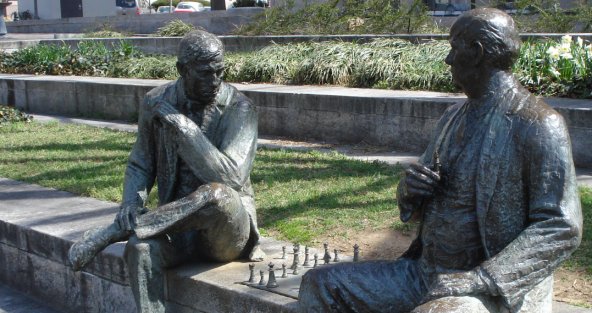Below is a draft of an article we submitted for “State Magazine.” Regualar readers will recognize some of the themes I monotonously return to in this blog. The text clearly has that bureaucratic feel necessary when writing for any in-house publication, and I did resisted the urge to put in some of my snarky comments, but it highlights some of the good work my colleagues are doing so I think it is worth posting and worth reading. Below that is an article I wrote for the “Foreign Service Journal” way back in 2001. Some of the cliche terms were just starting to be used back then. In the intervening eight years, some things have changed but the basics remain the same. We still have not really succeeded and we will never be finished, but there is some progress.
IIP engages new audiences with social media
By John Matel and William May
Social media is, above all, social. The increasing popularity of Facebook, Twitter, Short Message Service and podcasts gives public diplomacy practitioners unprecedented direct access to publics, opens doors to new overseas audiences and gives us the chance to engage people around the world in new ways. It is a opportunity and a challenge to pick the right tools.
The Department has more than 130 official Facebook pages, more than a dozen feeds on the Flickr photo-sharing Web site, nearly 40 Twitter accounts and a growing list of blogs. The Bureau of International Information Programs is taking the lead in employing these tools for international engagement, using cutting-edge technologies to reach people, remembering always that the medium ‑ the technology ‑ is not the message. We try to match the technology to the audience and the message.
At IIP we have found that using social media effectively often requires risk taking, creativity and a willingness to be on the cutting edge of these technologies. Fortunately, the Department’s leadership is firmly committed to seeking out and implementing these new approaches that expand our ability to engage in exchanges with foreign publics. As Under Secretary for Public Diplomacy and Public Affairs Judith McHale said recently, “[In] the right circumstances, the use of new media could be smart power at its best, as when employed in dialogue with wired constituencies.”
Global Outreach
An important aspect of the new technologies is the ability and the need to be where the customers are. IIP’s Digital Outreach Team connects with online users in Arabic, Persian, Urdu and Chinese, inserting the U.S. government’s voice into conversations on prominent blogs and forums and engaging an often skeptical audience on their own ground. The Iranian government has labeled the team “dangerous and subversive” for its online discussions of the need for greater openness, the economic costs of Iran’s hardliner attitude and Iran’s pursuit of nuclear capability. In fact, the team has engaged in a back-and-forth online dialogue in Persian with President Mahmoud Ahmadinejad’s media advisor. IIP’s blogging team gives Iranians an unfiltered look at a U.S. perspective on issues such as their nuclear programs and human rights.
“The blogging team’s willingness to address hard issues in an open and transparent way mitigates rancor and helps get our messages heard, copied and amplified,” said IIP Coordinator Jeremy Curtin.
IIP is also developing powerful new media tools for digital diplomats to allow them virtual personal contact with people worldwide. The bureau has turned Adobe Connect business conferencing software into a multimedia-platform outreach tool that allows U.S. diplomats to cheaply and easily engage with publics via the Internet over high- and low-speed networks. Dubbed “Co.Nx” (http://co-nx.state.gov), this tool integrates video, audio and print into a flexible platform that can carry the Secretary of State’s Town Hall meetings in Brussels to thousands of participants in Europe or, at slower speeds, transmit small interactive programs in Africa and Afghanistan.
New Meets Traditional
Working closely with the White House new media team, IIP developed the first worldwide mobile Short Message Service-based event, which was used to engage audiences around the world to discuss the President’s speeches in Cairo and Ghana. In Africa, where mobile phones are common but few have access to the Internet, the White House and IIP married Short Message Service with traditional radio broadcasts. People across Africa and the world texted more than 17,000 questions and 50,000 instant messages to the White House in three languages. President Obama produced a podcast that answered some of the Africans’ questions, and public diplomacy officers in Africa then took the podcast to radio stations, which broadcast it locally.
In another social media effort, IIP launched the “Democracy Video Challenge,” which attracted more than 900 video entries on YouTube (State Magazine tk.). A second round of the contest began in September.
IIP’s Office of Innovative Engagement, in collaboration with eDiplomacy, has launched the Social Media Hub (http://www.intelink.gov/communities/state/smp/), which contains user manuals for Facebook, Twitter and blogging. It also has best practices, an “Ask the Expert” section and news about training opportunities. This gives the posts overseas the encouragement and information they need to work effectively with new media. It also provides a platform to share their experiences with Washington and with each other so that the innovation, imagination, intelligence and specific knowledge of our colleagues around the world can be shared and engaged.
By using these new social media tools along with more traditional media and outreach, IIP is enhancing its ability to tailor and target public diplomacy messages to specific audiences. Even as it explores the frontiers of new media, IIP is keeping an eye firmly fixed on the fundamental social aspect of public diplomacy. At the end of the day, the bureau is still in the business of relating to and engaging with people.
The new technologies simply make doing that easier – and better.
John Matel is director of the IIP Office of Policy, and William May is director of the IIP Office of Innovative Engagement.
———————————————-
Below is the article I wrote in 2001.
Speaking Out
Public Affairs: Out of the Information Business
By John Matel
It is hard to recall a time before we could read today’s American newspapers anywhere in the world online, or watch coverage of breaking events on CNN or a host of other TV and Internet news channels. Yet until recently, it was enough for information officers to provide — well, information. Sometimes we provided the latest news, or at least news that local media had not yet seen. Press attachés frequently thought of themselves as a species of journalist, faithfully furnishing unbiased, or at least evenhanded, information and official statements to host-country media. Overseas opinion-makers were often regular readers of our products and the local media treated them as supplementary news services.
What a change! Media organizations and the State Department’s own Internet sites now give our former clients 24-hour access to timely and accurate information. They bypass local public affairs officers, who cannot compete with Washington and should not try. Yet if public affairs sections can no longer be “honest information brokers,” they can be effective policy advocates by using the Internet as a public diplomacy tool. Or to put it another way: The Internet will not replace public affairs, but it will revolutionize its practice.
Strategic vs. Tactical
Despite its ubiquitous quality, the Internet has not lived up to its potential as a public affairs tool. A key reason is confusion over strategic versus tactical use of the new methods. Washington Web sites and most mission sites are almost entirely strategic in that they provide content to support general goals and messages, are directed to a wide, self-selected audience, and are independent of specific public affairs campaigns. They are excellent information sources that compare favorably with those of large private enterprises.
A breakdown results when strategic Web efforts are inappropriately applied to tactical situations. An effective tactical Internet campaign must be forward-looking, support specific programs, be interactively targeted to particular audiences and time-sensitive. It also requires active, sustained support by other public affairs activities; in other words, it is a fully integrated part of a larger public affairs campaign that no longer just informs but advocates a point of view. In many respects, Internet, e-mail and user-friendly electronic databases fulfill the promise of the old USIS Distribution Records System: identifying and reaching the relatively small number of key opinion leaders and transmitters who shape the larger society’s attitudes. This is a necessary but not sufficient aspect of public affairs. To be effective, information must also stick with the consumer.
Making Information Stick
The biggest problem with information delivered via the Internet is that it is not “sticky.” Recipients either cannot recall the message or fail to integrate it into their outlook or behavior. The solution is not limited to making our information more exciting or relevant; what usually makes the real difference are the context of the message and the perceived character and credibility of the messenger. In other words, recipients must trust the source and know what to do with the information they receive.
Beaming data to Palm Pilots works for stock prices and sports scores because recipients are waiting for the information and know how to use it. They have context. The kind of information we disseminate as diplomats is more complicated than factual reporting, however, for we seek to influence, not merely inform. Public affairs events, personal meetings and media relations provide the glue, the context that renders message content relevant and makes it stick in the consciousness of opinion-makers. Without human and programmatic context, electronic resources are like encyclopedias. Without electronic resources, conversely, most programming falls seriously short of providing content. They need to be used together. Consider the following:
In a traditional scenario, we meet a contact at an event, promise to provide more information and maybe even remember to send it. By the time it arrives, however, the contact may have lost interest. We created an opening, but were unable to follow up with content. By contrast, the Internet can provide complete and timely information, but not required context. Thus, a contact browsing a State Department Web page might carefully read a piece of information and make a mental note of it, but quickly lose the “mental notepad” because he or she also read 50 other pages the same day.
Now imagine a combined strategy. The public affairs section organizes an event, with its own Web page offering links to information. Key contacts get e-mail invitations with links to the event page. They can browse the page and get a comprehensive idea of what they want to learn. As a result, we meet a fully primed contact at the event, and can concentrate on specific parts of the presentation. We can then follow up with more information provided by our Area Information Resource Center in an e-mail with Web page links later that day. Now the information sticks with the contact because of the additional context of the event and the personal attention. In fact, he or she may well share it with colleagues and friends, and perhaps refer them to the Web page or forward an e-mail. That is success.
Reaching the Right People
Obviously, the combined strategy is best. Beyond that, skillful use of databases and e-mail will maintain relations as long as the contact remains important. With these tools, we can fine-tune our efforts and maintain meaningful contact with a greater number of truly engaged people (opinion leaders) across a wider spectrum of issues, instead of dispersing our resources on a mass audience, most of whom are indifferent to the message or unable to act on it.
Without technology (or several personal assistants), an average person can maintain regular personal contact with 150 to 200 people during any particular period. This maximum is set by the limits in the number of hours in a day and human memory capacity. Working harder or longer will not significantly increase this number, but technology can, by creating the possibility of mass personalization. Targeted e-mail with Internet links can be very precise in creating contact opportunities, since databases are memory enhancers. Thus, using technologically enhanced methods, one officer can maintain meaningful targeted contact with thousands of individuals. Notice that I am not advocating that this contact work be completely automated, however. In the high-tech world, personal attention is actually even more important.
Toward A New Paradigm
Those who think that technology will make overseas officers irrelevant are as misguided as those who believe they can ignore technology. Information technology will never replace public affairs officers. On the contrary, technology increases the value of human interaction while providing tools that liberate public affairs both from the tedium of being a mere conduit for information and the exciting, but uncreative, experience of having journalists clamoring for the latest breaking news. Because the Internet has made information a free commodity, we no longer score points for providing it. We add value only by customizing information and making it recipient-specific.
Ironically, “hard” technology puts a premium on “soft” skills by devaluing rote, programmed procedures and making the product itself (raw information) less important than the channel of delivery (relationships) and customization (personalization). Also, by eliminating the external discipline of the urgent, the new technology necessitates more creative and self-motivated behavior. Making it all work together successfully requires a new paradigm for public affairs, one that blends our traditional communication and people skills with new communication and people skills.
Technology changes the terms of engagement, but our relationships are with people, just as they always have been, not with their computers or fax machines. Effective communication with people is still the only real business we are in.
Why have we applied these methods only sporadically to our public affairs? One reason is simple newness. Only recently has such communication become possible with a significant number of recipients. Everyone must get used to using the new system. But a more pernicious impediment to effective synergy of electronic communications with public affairs has been the structure of the State Department. New technologies mean different ways of doing business and challenge us to be flexible in everything from job descriptions to traditional perks. They cannot just be strapped on old management structures. The department’s hierarchical, sequential culture, where one step must be cleared up the chain before the next one can begin, is not well-suited to a new world where several problems must be solved simultaneously and hierarchy sometimes ignored. (Who should sing tenor in the choir? The ones who can, not necessarily the senior members.) Bosses are uncomfortable when they lack the requisite knowledge to clear the work of their expert subordinates and are therefore reluctant to trust decisions they make in response to uncertain circumstances. The commitment of State’s new management team to addressing this problem is encouraging, but convincing those who prospered under the old system is a tough challenge.
Nevertheless, it is a challenge that must be met. If an integrated approach is not applied, the department’s public affairs efforts will soon be ignored and irrelevant. If the State Department can’t explain and advocate American interests abroad in a timely and effective way, the task will pass to those better suited for the job or not get properly done at all. These are unacceptable alternatives. To succeed we must release the talent and energy we already have. Let’s do it.
John Matel, an FSO since 1984, has served in Porto Alegre, Oslo, Krakow and Washington. He is currently information officer in Warsaw.










